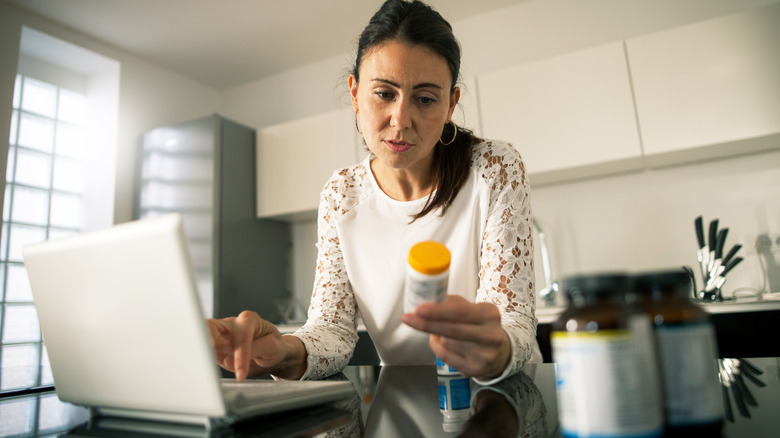
When a headache or body ache arises, many people commonly turn to ibuprofen, an effective remedy for inflammation and pain. While ibuprofen is a widely available over-the-counter (OTC) pain reliever, it can cause certain side effects, such as drowsiness. Thus, if you feel slightly sleepy after taking ibuprofen, there’s no need to worry. However, if you experience extreme tiredness, it’s advisable to consult your doctor. To better understand the side effects of ibuprofen, it’s crucial to explore how the medication functions.
Ibuprofen, a nonsteroidal anti-inflammatory drug (NSAID), is formulated to alleviate inflammation, moderate pain, and fever, as noted by the Alcohol and Drug Foundation. NSAIDs like ibuprofen are also frequently used to treat arthritis-related swelling and stiffness (per Medline Plus). Available in both tablet and liquid forms for children and adults, ibuprofen can be easily purchased at local stores, though higher doses might require a prescription. According to News Medical Life Sciences, ibuprofen works by inhibiting the enzyme cyclooxygenase (COX) in the body, which reduces the concentrations of prostaglandins, the mediators of pain and inflammation.
Although generally considered safe, ibuprofen does have side effects that may impact daily life. Discover why ibuprofen can cause tiredness and other side effects to be mindful of. We’ll also discuss how to reduce the tiredness associated with ibuprofen.
Ibuprofen can cause tiredness as a side effect

WebMD mentions drowsiness as a side effect of this medication. However, Advil states that regular ibuprofen isn’t typically known to cause tiredness as it lacks the usual components that induce drowsiness. Some products, however, do include a drowsiness warning. For instance, Advil PM combines the sleep aid diphenhydramine with ibuprofen to help you sleep and alleviate pain. Check your medication bottle to ensure it contains only ibuprofen. If tiredness occurs, it might indicate exceeding the recommended dosage, necessitating a call to your doctor, according to Medline Plus.
If you feel sleepy after taking ibuprofen, try to rest. Drowsiness can negatively impact cognitive functions, especially when performing tasks like driving and operating machinery. Additionally, Harvard Health Publishing advises that sleepiness induced by ibuprofen may require a conversation with your doctor. Pharmacist Laura Carr notes, “Many people report tiredness or fatigue as a side effect from their medicines. However, there are things you can do to minimize the feelings of daytime sleepiness […It] may simply be a matter of adjusting the dose or changing the medication that’s causing the drowsiness.”
Your sleepiness might not be caused by the drug itself but rather by the pain affecting your sleep quality. According to Carr, alleviating sleepiness from ibuprofen might require a good night’s sleep and avoiding substances that induce tiredness, such as alcohol.
Other common side effects of ibuprofen to watch for

Like any medication, ibuprofen has the potential for various side effects. Being available OTC doesn’t guarantee it’s safe for everyone. When ibuprofen inhibits COX from causing inflammation, it also impacts the stomach’s protective lining, as noted by the Hospital for Special Surgery. Consequently, NSAIDs may lead to nausea, vomiting, and indigestion. Prolonged NSAID use can result in a peptic ulcer due to stomach lining inhibition, as reported in a 2021 study in Clinical Medicine. If ibuprofen leads to persistent indigestion and stomach issues, contact your doctor promptly.
Ibuprofen can also cause headaches and dizziness, according to the NHS. Staying hydrated, avoiding alcohol, adhering to the recommended dose, and limiting frequent use is crucial, especially for those with headache disorders. If dizziness occurs, take a seat until it subsides and consult your doctor if it persists. Alcohol and caffeine can exacerbate dizziness, so it’s best to avoid them.
Some individuals may be allergic to ibuprofen and NSAIDs, leading to severe allergic reactions that require immediate medical attention. Symptoms of a severe reaction include shortness of breath, swelling, hives, itching, excessive tiredness, and a rapid heartbeat. Contact your healthcare provider immediately or seek emergency care if these symptoms occur.




